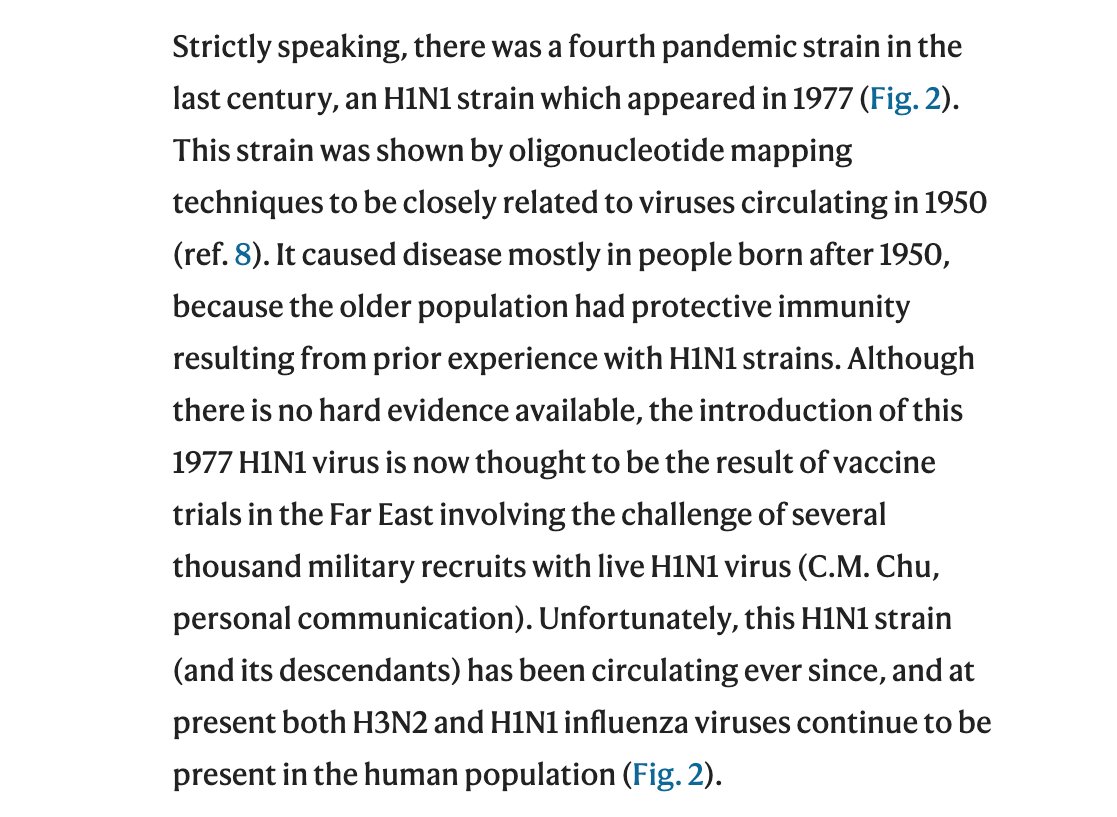We& #39;ve written a perspective on a new study by @MAMdayIndayOut that helps explain why some viruses (measles) don& #39;t evolve to escape immunity but others (influenza) do. Provides some clues relevant to future for #SARSCoV2 as well: https://www.cell.com/cell-reports-medicine/fulltext/S2666-3791(21)00073-2
Here">https://www.cell.com/cell-repo... is a recap: (1/n)
Here">https://www.cell.com/cell-repo... is a recap: (1/n)
Measles and influenza are both respiratory RNA viruses with high mutation rates. Immunity to measles is lifelong: before vaccines, people were infected just once in their lives. Then a measles vaccine was developed >50 years ago and it still works great today. (2/n)
Unfortunately, same is not true for influenza. Typical person is re-infected with same subtype of influenza every 5-7 yrs. Importantly, influenza re-infections are *not* because immunity is weak or transient. We know this from the 1977 flu pandemic. (3/n)
Specifically, 1977 flu pandemic was manmade & due to accidental release of old virus from 1950s. Peter Palese was told by famed Chinese virologist Chi-Ming Chu that release from misguided vaccine trial ( https://www.nature.com/articles/nm1141 ),">https://www.nature.com/articles/... although details have never been forthcoming. (4/n)
In any case, result was flu virus from ~25 yrs earlier reappeared in 1977. Older adults nearly completely protected, but children highly susceptible (study below). Demonstrates that flu immunity is potent & long-lasting like for measles *as long as virus doesn& #39;t evolve*. (5/n)
So reason we are re-infected by influenza every 5-7 yrs isn& #39;t because immunity is weak: it& #39;s because flu *evolves* to escape this immunity. But why isn& #39;t this true for measles too? Measles is also a respiratory RNA virus with high mutation rate, what& #39;s the difference? (6/n)
One hypothesis that has been proposed by my group & also @heatonlab @bensbrewny is that flu proteins might be more tolerant of mutations than measles proteins. I still think this is probably part of story. But it& #39;s definitely not full story, because... (7/n)
It& #39;s possible to lab-select measles virus mutants that escape monoclonal antibodies ( https://www.nature.com/articles/293067a0).">https://www.nature.com/articles/... But for measles virus, this capacity to escape monoclonal antibodies doesn& #39;t translate to a capacity to escape actual polyclonal antibody immunity. (8/n)
This suggests difference related to nature of polyclonal immunity. As we& #39;ve been hearing in context of #SARSCoV2, vaccines & infection elicit polyclonal antibodies, that can potentially bind many parts of a virus& #39;s surface protein(s). Broad binding makes escape difficult. (9/n)
But polyclonal antibodies can unfortunately be narrowly focused. Few yrs ago, we showed (w @juhyemlee @eguia_rachel @seth_zost @SCOTTeHENSLEY) that polyclonal antibodies to flu often so focused that 1 viral mutation can reduce neutralization >10x ( https://elifesciences.org/articles/49324 )">https://elifesciences.org/articles/... (10/n)
Now @MAMdayIndayOut has completed the picture with a new study in @CellRepMed showing that measles polyclonal antibodies have very broad activity, such that no single (or even double or triple) mutant has much reduction in neutralization ( https://www.cell.com/cell-reports-medicine/fulltext/S2666-3791(21)00041-0).">https://www.cell.com/cell-repo... (11/n)
Together, these data suggest that functional breadth of polyclonal antibody response is major determinant of whether a virus will be able to evolve to escape antibody immunity.
So will #SARSCoV2 be like influenza or measles? And can we make it more like measles? (12/n)
So will #SARSCoV2 be like influenza or measles? And can we make it more like measles? (12/n)
Well, we already know that other human coronaviruses evolve in a way that erodes polyclonal human antibody neutralization, more like influenza than measles. See this study by @trvrb ( https://elifesciences.org/articles/64509 )">https://elifesciences.org/articles/... & this one from our group ( https://journals.plos.org/plospathogens/article?id=10.1371/journal.ppat.1009453).">https://journals.plos.org/plospatho... (13/n)
And many groups have now shown that single mutations to #SARSCoV2 like E484K can appreciably reduce polyclonal antibody neutralization, as is the case for influenza but not measles mutations. (14/n)
This does not mean panic about #SARSCoV2 mutations. Current #SARSCoV2 variants still neutralized albeit at reduced levels ( https://twitter.com/jbloom_lab/status/1349190802879115266).">https://twitter.com/jbloom_la... It takes even fast-evolving flu viruses ~5 yrs to erode narrowly focused immunity enough that re-infection becomes common. (15/n)
But based on what we now know about flu / measles / coronavirus evolution & polyclonal antibody immunity, seems likely #SARSCoV2 could be closer to flu than measles in terms of how evolution affects immunity against reinfection (severe disease separate question). (16/n)
I& #39;d like to end on hopeful part. Results of @MAMdayIndayOut suggest that breadth of polyclonal antibody immunity is major factor in shaping viral antigenic evolution--and this is potentially within our ability to control via vaccine design. (17/n)
Ideally, #SARSCoV2 vaccines would elicit antibodies that broadly target many co-dominant neutralizing epitopes, similar to measles immunity and unlike flu immunity. (18/n)
We & others are already comparing breadth of epitopes targeted by natural vs vaccine immunity ( https://twitter.com/jbloom_lab/status/1382475939678855169),">https://twitter.com/jbloom_la... & many groups are working on new #SARSCoV2 vaccines designed to increase this breadth (eg, @veeslerlab @KingLabIPD @bjorkmanlab @McLellan_Lab @WardLab1) (19/n)
To extent possible, we should prioritize #SARSCoV2 vaccines that elicit polyclonal antibody neutralization to multiple co-dominant epitopes (like measles), & avoid flu-like situation where neutralization is narrowly focused and appreciably impacted by single mutations (20/n)

 Read on Twitter
Read on Twitter



